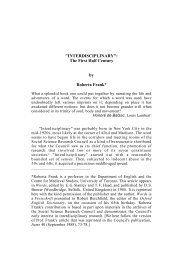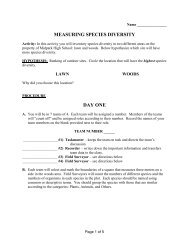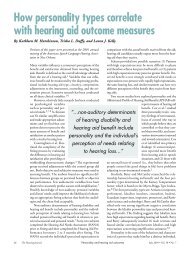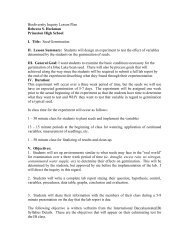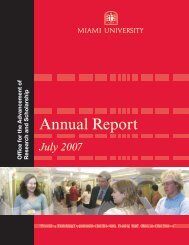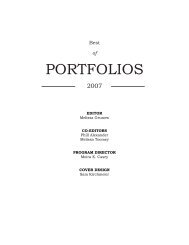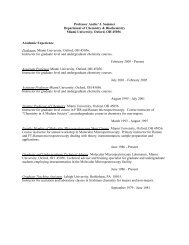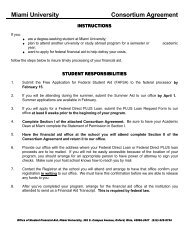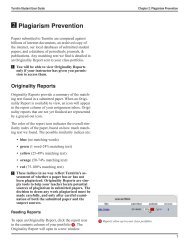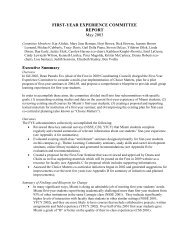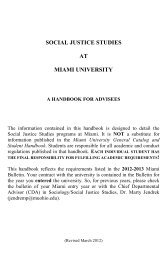Interdisciplinary Research Manual - Units.muohio.edu
Interdisciplinary Research Manual - Units.muohio.edu
Interdisciplinary Research Manual - Units.muohio.edu
Create successful ePaper yourself
Turn your PDF publications into a flip-book with our unique Google optimized e-Paper software.
19<br />
assistance—to deliberately reveal what you don’t know—not to show off what you know<br />
or to demonstrate that you’ve got everything under control. (In the senior project<br />
conference, of course, you give a formal presentation designed to show off what you<br />
know about your topic, but that presentation is public, not in workshop.) The point of<br />
these presentations is to help you with a process, not to demonstrate that you’ve produced<br />
some kind of product.<br />
In your five minute oral presentation, state what topic you’re thinking about and<br />
what perspectives you anticipate drawing on; then in a sentence or two state what excites<br />
you about the topic (i.e., the reason you’re focusing on this topic or the reason others<br />
should care about the topic); and then reveal (at greater length) any reservations, qualms,<br />
uncertainties, or worries you have about the topic. Even if you feel you have your topic<br />
pretty well nailed down, your discussions with your advisor may well have raised<br />
concerns about the implications of your topic down the road: e.g., I’m still really excited<br />
about my topic, but my advisor made me realize that if I’m really going to follow through<br />
on it, I’m going to have to learn something about the discipline of economics or the subtopic<br />
of banking that I really didn’t want to deal with; or I’m going to have to collect<br />
some data and I don’t know how to analyze data statistically. The information you<br />
present on your topic and the perspectives you plan to draw on will also be useful when<br />
you all come to organize yourselves into affinity groups. Since you’ve only got five<br />
minutes in which to present, and at least four points to make in that time, it’s probably a<br />
good idea to prepare some notes on what you want to say. (These notes are for your use;<br />
you don’t hand them in to the workshop director. It might be helpful to you, however, to<br />
show them with your advisor and discuss the feedback you got in workshop.)<br />
It’s important to take this opportunity to try your idea for a topic out on a wider<br />
audience than your advisor and immediate circle of friends to see how people from a<br />
range of academic disciplines and interdisciplines respond to the topic. Remember that<br />
you will be writing the project to be understandable and engaging to liberally <strong>edu</strong>cated<br />
readers in general, as well as to specialists in your field. You’ve got a sales job to do in<br />
order to interest that general audience in your topic so they’ll read your project. Your<br />
classmates in senior workshop with their wide range of topical interests provide a pretty<br />
good test of how liberally <strong>edu</strong>cated readers in general will respond to your project.<br />
Observe how they react to your presentation: are they catching on—picking up on what<br />
you’re saying and why it’s exciting—or are they just sitting there; do their eyes light up<br />
or glaze over?<br />
Giving feedback on presentations. As you listen to presentations, ask yourself:<br />
(1) Do you understand the topic (and does it make any sense to you); (2) Do you see why<br />
this topic is supposed to be interesting; (3) If you were planning to study this topic,<br />
would you draw on the same set of disciplines and interdisciplines, or do you see other<br />
perspectives that would be helpful as well; (4) Do you see another topic or another slant<br />
on that topic that would get even better at the interests of the presenter; and (5) Do you<br />
have any useful response to the concerns or doubts expressed by the presenter? Oral<br />
responses in seminar also need to be succinct if not pithy: you can state a point but you<br />
can’t elaborate it if everyone is to complete their feedback on a project in 5 minutes: to<br />
get even five points aired, each will have to be stated in a minute or less. If you want to<br />
develop a point for the presenter, do so after class.



